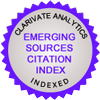Tedarikçi Seçiminde İşletmelerde Sistem Yönetimi ve Güvenliği Kriterlerine Dayalı Bir Karar Modeli ve Modelin Uygulaması
Semih Coşkun, Olcay Polat, Bayram KaraPamukkale Üniversitesi, Mühendislik Fakültesi, Endüstri Mühendisliği BölümüModern piyasa şartlarında rekabet gücünü devam ettirebilmek için tedarik zincirlerinde ana üretici, tedarikçi ve müşteri ilişkilerinin etkin ve sürdürülebilir bir şekilde yönetimini gerektirmektedir. Tedarikçi rolü, bir taraftan müşterisi konumundaki işletmenin taleplerini istenilen maliyette, kalitede, zamanda ve esneklikte sağlayabilmeyi gerektirirken, aynı zamanda sistem, ürün ve çevre güvenliği şartlarını sistematik bir şekilde yönetmesini gerektirmektedir. Etkin bir tedarik zinciri yönetiminde önemli bir yere sahip olan tedarikçi belirleme kararları, nitel ve nicel faktörlerin bir arada değerlendirildiği karma yönetim karar destek modelleri ile daha tutarlı olacaktır. Bu doğrultuda yapılan çalışmada, sistem bütünlüğü esas alınarak, dinamik bir tedarikçi seçim sürecinin tasarlanması ve modellenmesi amaçlanmıştır. Bu amaçla Balanced Scorecard perspektifleri temelli ve sistem güvenliği esaslı değerlendirme kriterleri oluşturulmuştur. Kriterlerin önem derecelerinin belirlenmesinde Bulanık Analitik Hiyerarşi Prosesi yönteminden faydalanılmıştır. Alternatif tedarikçiler arasından sistem güvenliği esasına göre en uygun olan tedarikçinin seçilmesi ise Fayda Aralığı Temelli Etkileşimli Grup karar verme yöntemi ile belirlenmiştir. Önerilen modelin sınanması için hizmet sektöründe faaliyet gösteren bir havaalanı işletmecisi seçilmiştir. Sonuç olarak sunulan modelin uygulamada tutarlı sonuçlar üreten bir tedarikçi seçim karar modeli olduğu ortaya konulmuştur.
Anahtar Kelimeler: Tedarikçi seçimi, Balanced scorecard, Bulanık analitik hiyerarşi Prosesi, Fayda aralığı temelli etkileşimli grup karar verme yöntemi, Sistem güvenliği
A Decision Model for Supplier Selection based on Business System Management and Safety Criteria and Application of the Model
Semih Coşkun, Olcay Polat, Bayram KaraPamukkale University, Engineering Faculty, Dept. of Industrial EngineeringIn modern market conditions, sustainable and effective management of main manufacturers, suppliers and customer relationship is a necessity for competitiveness. Suppliers must satisfy customers expectations such as cost minimization, quality maximization, improved flexibility and achieved deadlines; which is also required for systematic management of products, work and environmental safety. The supplier selection process is consistently getting more complicated by the effect of increasing amount of suppliers and supplier selection criteria. Supplier selection decisions which take an important role in efficient supplier management will be more consistent by the application of decision making models which integrate the quantitative and qualitative evaluation factors. In this study, a dynamic process is designed and modeled for supplier selection. For this purpose, evaluation criteria are established according to the Balanced Scorecard perspectives, system sustainability and safety requirements. Fuzzy Analytic Hierarchy Process method is used for evaluating the importance of supplier selection criteria. A utility range-based interactive group decision making method is used for the selection of the best supplier. In order to test the proposed model, a representative from airport operation sector is selected. Finally, it is revealed that the application of the proposed model generates consistent results for supplier selection decisions.
Keywords: Supplier selection, Balanced scorecard, Fuzzy analytic hierarchy process, Utility range-based interactive group support system for multi-attribute decision making, System safety
Makale Dili: Türkçe





